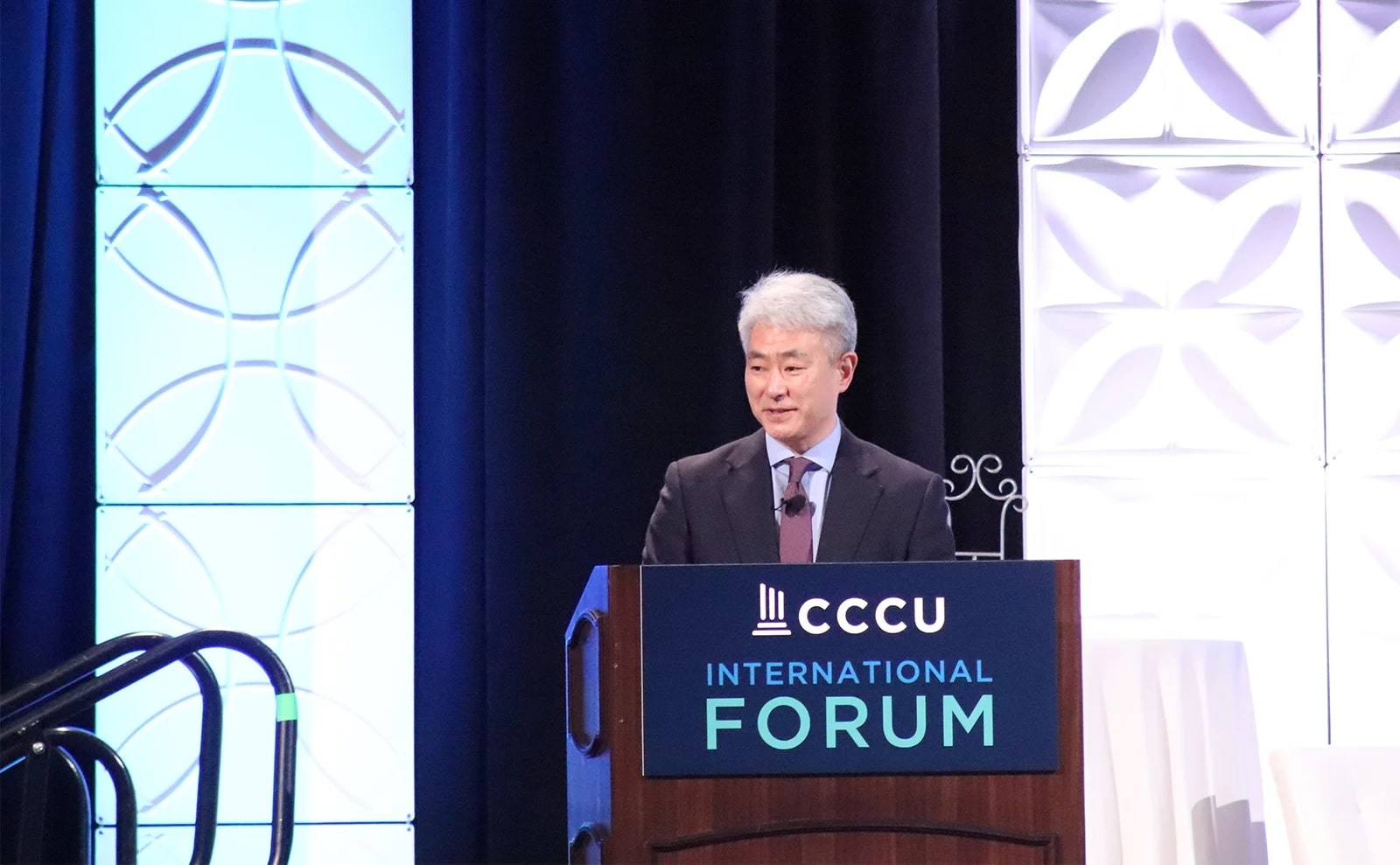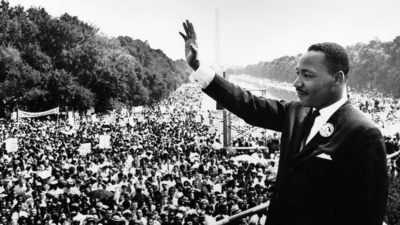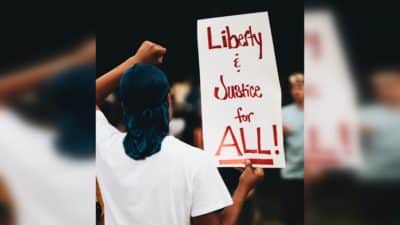The National Association of Evangelicals has hired a director of its new Racial Justice & Reconciliation Collaborative, an initiative aimed at providing resources and training for churches in its 40 member denominations.
Mekdes Haddis, the new initiative’s director, was hired for the full-time role a month ago after serving in church and nonprofit circles for more than a decade. She is working remotely from South Carolina for the Washington-based evangelical organization.
“I’ve talked with many NAE member organization leaders and have been excited to discover a great deal of self-awareness and earnest desire for reconciliation,” she said in a statement. “There is a lot of synergy and commitment to the task.”
In 2020, the NAE inaugurated Walter Kim, a Korean American theologian, as its new president. At the same Washington ceremony, John K. Jenkins Sr., the African American senior pastor of Maryland’s First Baptist Church of Glenarden, was installed as chair of the NAE and former Wesleyan Church General Superintendent Jo Anne Lyon as vice chair.
Kim has made recent appearances at the Ethics and Public Policy’s Faith Angle Forum and the Council for Christian Colleges & Universities International Forum at which he has spoken about the racial diversity of evangelicals.
Your tax-deductible gift helps our journalists report the truth and hold Christian leaders and organizations accountable. Give a gift of $30 or more to The Roys Report this month, and you will receive a copy of “Hurt and Healed by the Church” by Ryan George. To donate, click here.
In an interview after his remarks at the CCCU meeting, Kim said he hopes the collaborative will help religious institutions within and beyond the NAE “that want to take a next step from ‘I’ve read this book’ or ‘I’ve seen this webinar.’”
Kim also said he hopes the collaborative will offer a place of respite for the “exhaustion” and “a spiritual oasis of encouragement for people of color working in predominantly white institutions.”

In an article for Faithfully magazine four years ago, Haddis, an Ethiopian immigrant, addressed that exhausting experience, writing of her desire to “bring healing” to evangelical Christianity as she sought to preserve her cultural identity.
“For those interacting with me in the United States, especially those in the church, I represented a group of people from which they isolate themselves,” she wrote in the article, titled “Embracing My Otherness in the US Evangelical Church.”
“I discovered that I was first Black, second a female, third an immigrant, and lastly (if we got there) a Christian.”
Haddis is author of the forthcoming book “A Just Mission: Laying Down Power and Embracing Mutuality.”
The Lilly Endowment is providing $1 million to support the NAE’s collaborative, which comes at a time when other evangelical organizations have also attempted to work on race relations in long-term initiatives.
Last year, World Vision U.S., an evangelical Christian humanitarian organization, completed what an executive there called “a one-year mutual learning journey towards a Biblical understanding of what it means to pursue racial justice.”
In November, hundreds of evangelical Christians gathered at the Museum of the Bible to kick off the “Let’s Talk” initiative to listen to stories of racism and make plans to build racial unity. It has continued through monthly Zoom meetings with leaders, including Jenkins, gathering in small group discussions.
“I do think that there is a constituency of people whose hearts are open to recognizing the need to address the tension and the division that’s greatly in our country,” said Jenkins, who credited Kim with creating the NAE’s collaborative.
Kim, who also is a teacher in residence at Trinity Presbyterian Church in Charlottesville, Virginia, said in a statement that he expects NAE’s new three-year commitment will last much longer.
“Of course, the NAE’s commitment to racial justice and reconciliation expresses a belief that the Church should be deeply engaged in this work as a reflection of our beliefs,” he said. “As such, it will be an ongoing aspect of our work.”
 Adelle Banks is production editor and a national correspondent at Religion News Service.
Adelle Banks is production editor and a national correspondent at Religion News Service.




















8 Responses
Amen. I would prefer to see the church lead the way in pursuing racial justice and reconciliation than worldly organizations. Instead of Sunday mornings continuing to be the most “segregated hour” of the week, it’s time the church shows the world what it means to truly love, value, and include others who are different from us the way Christ did.
A whole lot of politics are going to have to be abandoned, and good riddance.
Where in the Bible does it talk about racial justice and equity? It does talk about the poor, widow and the orphan. Paying a just wage and not withholding a laborers paycheck. We are to love our enemies of which is not something we naturally would do. What exactly does this nebulous term racial justice actually mean? Biblical justice is different from this focus on race. I do not believe this victim mentality is what the Lord meant by justice for the oppressed and downtrodden. Here is an idea/why don’t individual pastors or congregants go and meet with other people. Go to a concert, say hello to your neighbor, go hear a gospel choir. Play music and listen to jazz or the blues. Have some fun exploring another cultural context.
Isa 1:16-17
Wash and make yourselves clean.
Take your evil deeds out of my sight;
stop doing wrong.
Learn to do right; seek justice.
Defend the oppressed. a
Take up the cause of the fatherless;
plead the case of the widow.
And as a chaser, look up how the Bible talks about foreigners and sojourners and come back and tell us how that compares to the immigration policies supported by the majority of evangelical Christians.
Vance –
As Christians, racial justice should be about making sure Biblical justice is handed down REGARDLESS of race. We see how God handled racism in scripture thru the punishment of Miriam for her racism against Moses’s wife, and in how Jesus went thru Samaria – a place where Jews, due to the racism-fueled hatred between them and the Samarians, would walk around to avoid – and ministered to a Samarian woman. Race did not stop him from ministering – and it shouldn’t stop us either.
Also, racism and poverty are heavily intertwined. But that’s a whole other thread.
And what is a ‘victim mentality’? I am a Black woman, a descendant of slaves, and daughter of parents who grew up in the segregation era (and they aren’t even 70 yet). I was raised to praise GOD for how we have survived and thrived amidst circumstances designed to reinforce our inferiority – or even bring about our demise. I hate how mentioning what we have been through over 8 generations is met with responses of “stop with the victim mentality” rather than “praise God for that testimony” – especially from fellow believers.
And finally, people of another race should not be your “enemy.”
How are ‘racism’ and poverty intertwined? The problems in the US are inequities in education, work ethic, family stability, primarily. Education is an issue because children in poor areas have usually got only poorly run schools that don’t educate, no family ethos of reading and education, no ambition for getting and keeping a job and finding self-development opportunities that don’t involve welfare. Thomas Sowell is my source here.
Hi David –
That’s a whole other conversation that would hijack this thread. But a lot of poverty is generational, and can be traced back to when policies related to Jim Crow (when Black schools were not as equally funded), redlining, and the like kept a lot of money and education opportunity out of Black areas. Race covenants (which can still be found “creatively rewritten” in certain areas) also kept Black buyers out of wealthier neighborhoods even when they could afford them….that is generational wealth that was robbed of people based on race. For example, imagine if my parents – who are a doctor and a lawyer – could have moved into certain upper class areas and passed that home down to me and my siblings like white families did? Saw it happen to some of my classmates.
And this is not just an American thing. All over the world, look at the demographics of impoverished areas (Brazil, France, South Africa,etc), and I can point you to policies of racism that created and reinforced the problem years ago. It’s not coincidence or because they are lesser people.
Then you have the robbing of wealth thru skewed appraisals (we are seeing recent cases where evidence that the sellers are Black lessens valuations of the same property, to the point that realtors advice Black homeowners to “remove anything that indicates you are Black” to get the best appraisal).
Again, don’t want to hijack the thread. But these are just a few examples of how poverty and race are intertwined.
Do I think two parent households and other personal decisions could improve this (like Sowell says)? Yes. But that’s oversimplifying a very complex issue and denying the far reaching impacts of racism.
Galatians 3:28 and Philippians 2:1-4.
That said, it looks like a pandering to the world to me. OTOH, the church needs a serious look at itself if the beige people (like me) have not treated the less beige (every other shade of melanin) in any way other than Paul directs in these two passages. Perhaps Grace Community Church elders could exert some ‘discipline’, which they seem quite adept at doing.